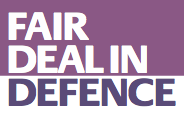All members must act now to stop the department effectively cancelling your membership without your permission and by signing up for direct debit you could win £1,200.
This notice from the MoD will effectively cease your trade union membership, unless you take action to safeguard it.
A political attack
We made strong arguments to stop the department ending check-off and also made the case for a longer notice period, but the department chose to ignore our legitimate concerns. Trade unions are being singled out as charities and other organisations will continue to enjoy check-off.
PCS general secretary Mark Serwotka said: "This is an unnecessary political move by the Tories, but we’ll not let them undermine us. Please sign up today to help our union remain a strong and independent advocate for members."
Act now to protect your membership
You can help secure our future, remain a PCS member and stay protected at work against an increasingly hostile employer by giving our union your direct debit details now.
We need as many members as possible to act now, so that we can guarantee a smooth transition and continuity of membership as check-off is withdrawn.
Your bank details will be held securely on our union’s systems, which are compliant with data security procedures.
There is no advantage to leaving things until the last minute. You won’t end up paying twice, or paying more, but you could end up without the protection of your union.
Sign up and ask a colleague toregister their details, too.
This notice from the MoD will effectively cease your trade union membership, unless you take action to safeguard it.
A political attack
We made strong arguments to stop the department ending check-off and also made the case for a longer notice period, but the department chose to ignore our legitimate concerns. Trade unions are being singled out as charities and other organisations will continue to enjoy check-off.
PCS general secretary Mark Serwotka said: "This is an unnecessary political move by the Tories, but we’ll not let them undermine us. Please sign up today to help our union remain a strong and independent advocate for members."
Act now to protect your membership
You can help secure our future, remain a PCS member and stay protected at work against an increasingly hostile employer by giving our union your direct debit details now.
We need as many members as possible to act now, so that we can guarantee a smooth transition and continuity of membership as check-off is withdrawn.
Your bank details will be held securely on our union’s systems, which are compliant with data security procedures.
There is no advantage to leaving things until the last minute. You won’t end up paying twice, or paying more, but you could end up without the protection of your union.
Sign up and ask a colleague toregister their details, too.




















